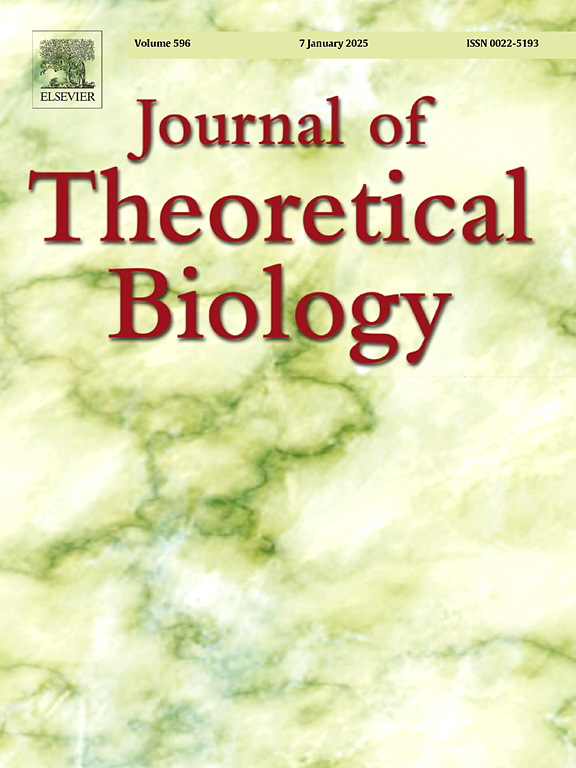具有非线性密度依赖调节的黄菖蒲动力学的温度驱动、阶段结构随机模型中的灭绝和持续。
IF 2
4区 数学
Q2 BIOLOGY
引用次数: 0
摘要
我们提出了先前开发的玉米叶蝉(Dalbulus maidis)的随机阶段结构模型的扩展,玉米叶蝉是玉米作物的重要害虫和媒介。该扩展模型引入了若虫期的非线性密度依赖调节,由玉米植株叶面积动态依赖的承载能力介导。昆虫和寄主植物的动力学都被明确建模,但相互作用是不对称的,因为在本配方中植物不受昆虫的影响。我们的主要目标是探索温度驱动的发育和寄主植物动态之间的相互作用如何影响昆虫种群的长期行为,从而导致灭绝或持续存在。利用室内和野外数据进行参数化模拟,分析了温度和玉米发育对昆虫动态的影响,并评估了该模型是否能在现实条件下再现观测到的丰度模式。该模型框架为未来的扩展提供了生物学基础和灵活的基础,包括病原体传播和玉米与昆虫之间的双向反馈。本文章由计算机程序翻译,如有差异,请以英文原文为准。
Extinction and persistence in a temperature-driven, stage-structured stochastic model of Dalbulus maidis dynamics with nonlinear density-dependent regulation
We present an extension of a previously developed stochastic, stage-structured model of Dalbulus maidis (corn leafhopper), an important pest and vector in maize crops. The extended model introduces nonlinear density-dependent regulation on the nymphal stage, mediated by a carrying capacity that dynamically depends on the leaf area of maize plants. Both insect and host-plant dynamics are explicitly modeled, but the interaction is asymmetric, as the plant is not affected by the insect in the present formulation. Our main objective is to explore how the interplay between temperature-driven development and host-plant dynamics shapes the long-term behavior of the insect population, leading to either extinction or persistence. Using simulations parameterized with laboratory and field data, we analyze how temperature and maize development affect insect dynamics, and assess whether the model can reproduce observed abundance patterns under realistic conditions. This modeling framework provides a biologically grounded and flexible basis for future extensions, including pathogen transmission and bidirectional feedback between the maize and the insect.
求助全文
通过发布文献求助,成功后即可免费获取论文全文。
去求助
来源期刊
CiteScore
4.20
自引率
5.00%
发文量
218
审稿时长
51 days
期刊介绍:
The Journal of Theoretical Biology is the leading forum for theoretical perspectives that give insight into biological processes. It covers a very wide range of topics and is of interest to biologists in many areas of research, including:
• Brain and Neuroscience
• Cancer Growth and Treatment
• Cell Biology
• Developmental Biology
• Ecology
• Evolution
• Immunology,
• Infectious and non-infectious Diseases,
• Mathematical, Computational, Biophysical and Statistical Modeling
• Microbiology, Molecular Biology, and Biochemistry
• Networks and Complex Systems
• Physiology
• Pharmacodynamics
• Animal Behavior and Game Theory
Acceptable papers are those that bear significant importance on the biology per se being presented, and not on the mathematical analysis. Papers that include some data or experimental material bearing on theory will be considered, including those that contain comparative study, statistical data analysis, mathematical proof, computer simulations, experiments, field observations, or even philosophical arguments, which are all methods to support or reject theoretical ideas. However, there should be a concerted effort to make papers intelligible to biologists in the chosen field.

 求助内容:
求助内容: 应助结果提醒方式:
应助结果提醒方式:


